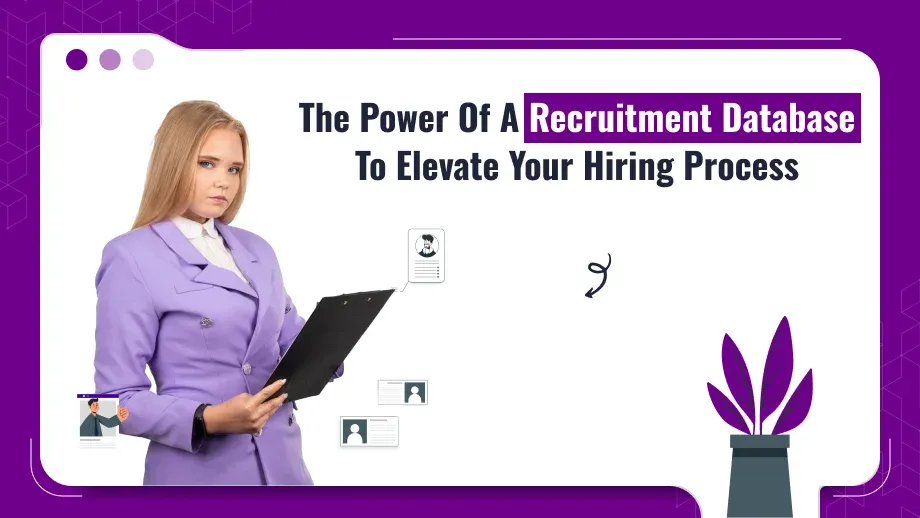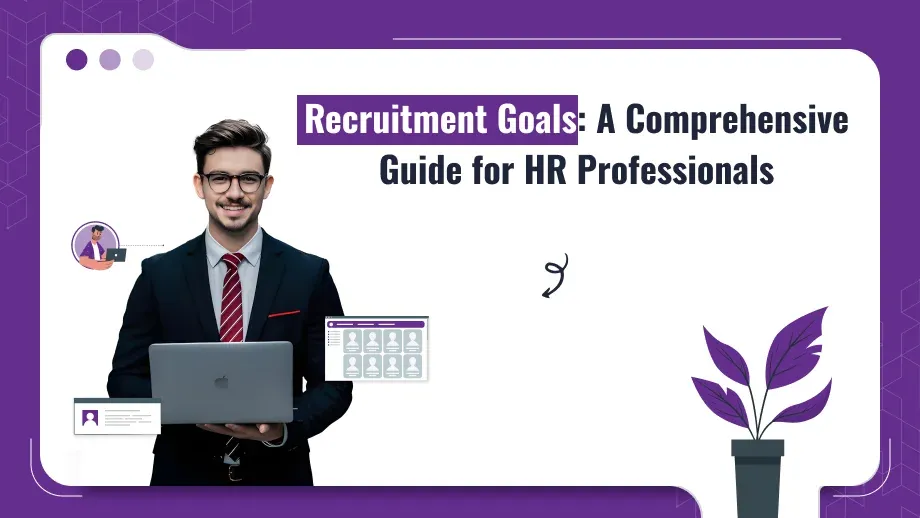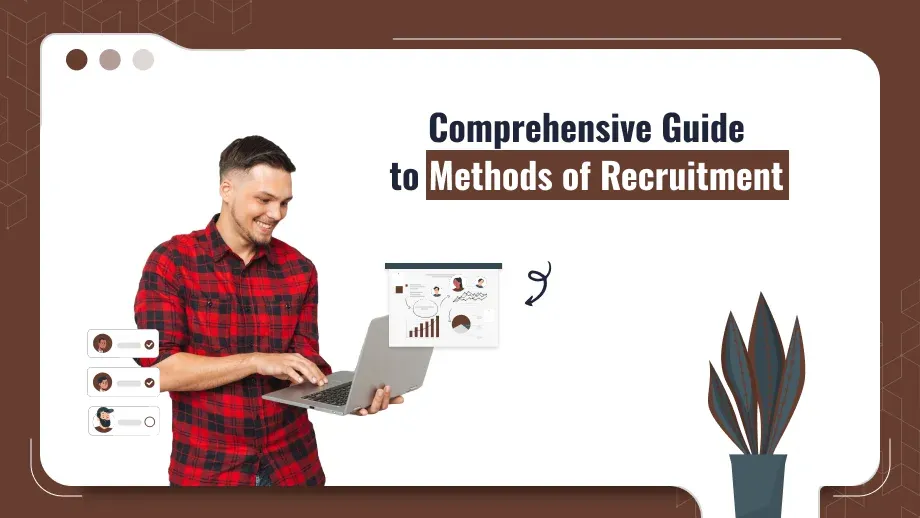
This is what breaks or makes business for all HR professionals, HR managers, CHROs, and CEOs. It’s changing fast, hurrying that traditional methods cannot keep pace. Moreover, it is too complex of a process to be executed through old-school methods. Here is where the recruitment database comes into the picture right and the most effective tool to smoothen and optimize hiring while connecting with the best talent, faster than ever before.
What Is A Recruitment Database?
A recruitment database is the one platform to access and manage all candidate information for storage and analysis. It acts as the core of your talent acquisition process, providing you with a 360-degree view of the potential candidates, their skills, and past interactions or dialogue with your company. Whether it’s applying your application management, tracking candidates through interviews, or analyzing hiring data you have everything in one place and easily accessible.
Why Use A Recruitment Database?
A database from a recruitment company will provide multiple advantages that would transform your way of hiring. It centralizes all your candidate data for easier access by the HR teams and decision-makers. It means better communication, there’s consistency, and less chance of losing precious candidate information.
This would further help in better hiring. Features like advanced search filters, candidate tagging, and data categorization allow recruiters to quickly get the best candidate for a specific role. The saved time is not wading through hundreds of spreadsheets and documents can be spent on worthwhile engagement with candidates to improve the quality of hire and experience of the candidate.
You can also maintain a recruitment through which you’ll always have a pool of qualified candidates; therefore, you can build a talent pipeline. You’re not going back to square one for every new role. That’s the proactive way of managing talent: reducing the time to hire and the possibility of having the cream of the crop with you.
Benefits Of A Recruitment Database
Centralized Information for Easy Access
Imagine having all your candidate data, resumes, cover letters, and interview notes in one place. It means information is always available when you need it not when you lose critical candidate details.
Hire Faster
With advanced search filters and candidate tagging, you can find individuals with specific skills or experience in seconds. No more trawling through spreadsheets or email inboxes—it can find the right candidate in seconds.
Better Collaboration
It can bring HR teams, hiring managers, and decision-makers together. Team members can leave notes, review candidate progress, and make decisions together. Transparency means a smoother and more efficient hiring process.
Measure Success
This is data-driven recruitment. It will enable you to track the key hiring metrics: time to fill, cost per hire, and candidate satisfaction; therefore, it makes information available to HR leaders for their hiring strategy to attract the right talent.
Build a Talent Pipeline
Instead of starting from scratch with each new role a of means you can build a talent pipeline to tap into whenever new roles come up. You can find candidates who have applied or expressed interest in your organization—save time, money, and effort.
Overcome Recruitment Challenges
Recruitment challenges like managing large volumes of applications, compliance, and finding remote talent can be solved with the right recruitment software. A well-maintained one will fix these challenges.
Training and Compliance Tracking
Recruitment databases often have features to track training and compliance requirements for candidates. So the candidates you are considering meet the necessary qualifications and certifications for the role.
Access to Remote Talent
This means it is easier to search for and track remote talent since more people are working remotely, and the location preference of candidates can be considered; this means you can find those who may be open to working remotely.
Better Candidate Experience
A recruitment database means you may give a better candidate experience because you’re automating key touchpoints and timely communication, which helps you avoid delays in the hiring process, thereby having more satisfied candidates, as well as a better employer brand.
Cost Efficient
A recruitment database is cost-effective, both for recruitment and in-house HR teams: hiring quicker, cutting down on time to hire, and the cost per hire. The upfront investment is recouped in improved hiring outcomes and more efficient processes.
Your Increase your recruitment strategy’s effectiveness!
Harness the power of our Recruitment Database to simplify candidate sourcing and management.
How to Choose the Best Recruitment Database for Your Recruitment Agency?
Scalability: Does the database grow with your business and can handle increasing volumes of candidate data?
Integration: Match the database that can align perfectly with your current systems, which include Employee database management, Applicant Tracking Systems, and analytics hiring platforms.
User Friendly: Select a solution that is user-friendly for your team. An unnecessarily complex database will slow down your recruitment process and frustrate your team.
Customization: The best databases allow you to customize fields, filters, and workflows to suit your hiring needs.
Data Security: The database should comply with data protection regulations to protect candidate data.
Analytics and Reporting: Good recruitment should provide analytics and reporting that could help you track key metrics and work on adjusting your hiring strategy from the data and findings that have been obtained. Among the most important metrics are time to hire, source of hire, and candidate satisfaction which must be optimized for better recruitment.
Customer Support: Effective recruitment software should always have quality customer support. Whether it is via live chat, phone, or email, having this assistance will be at your fingertips to ensure the problems can be solved promptly and kept running smoothly in your hiring process.
How To Maintain A Recruitment Database?
Data Cleansing: Remove old or irrelevant candidate data to keep the database useful and efficient.
Consistent Data Entry: Standardize how data is entered to keep the database consistent. Data in this database can be tagged or categorized accordingly.
Automation: Use automation tools to schedule follow-ups, update candidate status, and send reminders. This will save time and improve the candidate experience.
Update Candidate Profiles: Update candidate profiles with new skills, certifications, and experiences. This will help you find the best fit for future roles.
Engage Candidates: Keep in touch with your talent pipeline to keep candidates engaged. Especially for remote talent and future hires.
Update Recruitment Database Software: This software providers release updates with new features and security patches. Make sure your software is up to date to get the most out of it.
Data Backup: you will be saving your database so that you do not lose candidate details in case of system crashes or other unexpected problems.
How to Utilize a Recruitment Database When Managing Recruiting Challenges?
Managing Bulk Application Volume: with advanced filtering, you can easily filter candidates according to their skills, experience, or qualifications and manage a huge volume of applications.
Compliance: This tool can help you, in assurance of the compliance of your hiring process with the regulations on an industry basis. With features like audit trails and compliance checklists, you are going to be able to tick all the right boxes.
Finding Remote Talent: With remote work on the rise, it can help find candidates open to remote opportunities and expand your talent pool.
Candidate Experience: It can enhance the candidate experience with automated communication, and keep the applicants updated and informed throughout the hiring process. Emails and timely updates will make a difference to the candidate’s satisfaction.
Talent Pool: The possibility to store candidates for future recruitment purposes even if they’re not selected for a current role. This helps create a pipeline of pre-qualified candidates for future roles and saves time to hire.
Time to Hire: By automating repetitive tasks and having access to candidate data at your fingertips a database will reduce the overall time to hire. You can fill roles faster and not lose top talent to others.
Recruitment Database vs Candidate Database for Recruiters
A recruiter and a candidate database for recruiters are the same, but in slight variations, they differ from each other. This is a one-stop tool that stores candidate information and administers the entire recruitment process. A recruitment database software for recruiters is more focused on the storage and retrieval of candidate profiles.
Free Candidate Database for Recruiters
For small companies or even startups with limited budgets, the free candidate database for recruiters is often a good starting point. While not offering all the advanced features as in paid recruitment software, these options help you store and access your candidate data. Well, to be honest, tools like Google Sheets or free versions of ATS software are a free candidate database for recruiters to manage their hiring process more wisely.
How To Get The Most Out Of A Recruitment Database?
Use advanced filters on search: a database of candidates for recruitment comes equipped with advanced filters on search. Use the filters to narrow down candidates by qualifications, skills, or experience save time, and increase efficiency.
Automate Candidate Communication: Automate emails for interview invites, follow-ups, and rejection notifications to free up your team’s time and ensure timely communication, thereby having good candidate experiences.
Tag and Segment Candidates: The candidates will be categorized with the help of tags and segmentation in the database, considering skills, industries, or even experience levels. This will make it easier to search and filter candidates for future roles.
Use Analytics to Improve Hiring: Use your analytics hiring and reporting in the recruitment of candidates to see trends and inefficiencies in your hiring. Such metrics as a source of hire, time to hire, and candidate engagement will help you refine your recruitment strategy.
Integrate with Other HR Tools: To maximize its potential, your recruitment would do well to be integrated with other tools or software for human resources, particularly the Applicant Tracking Systems, employee database management, and onboarding tools. This will create a seamless flow of data across different stages of the employee lifecycle.
Get Your Team Trained Frequently: You have to ensure your HR team is properly trained on how to apply the recruitment of candidates to get proper recruitment done. The more frequent the scheduled training sessions, the better your team members will be updated with the new features, best practices, and how they can leverage the software.
Conclusion
A recruitment database is an essential instrument that all HR leaders and decision-makers must possess if hiring is to regain its former glory in today’s very competitive job market. It brings efficiency, organization, and data-driven decision-making into recruitment to ensure the HR team focuses on what matters: the right talent to help grow your business.
Whether it is a talent pipeline, a candidate database for recruiters, or overcoming recruitment challenges, the recruitment software can be a winner. It can also integrate with Employee Database Management and ATS to manage your entire recruitment and employee lifecycle.







